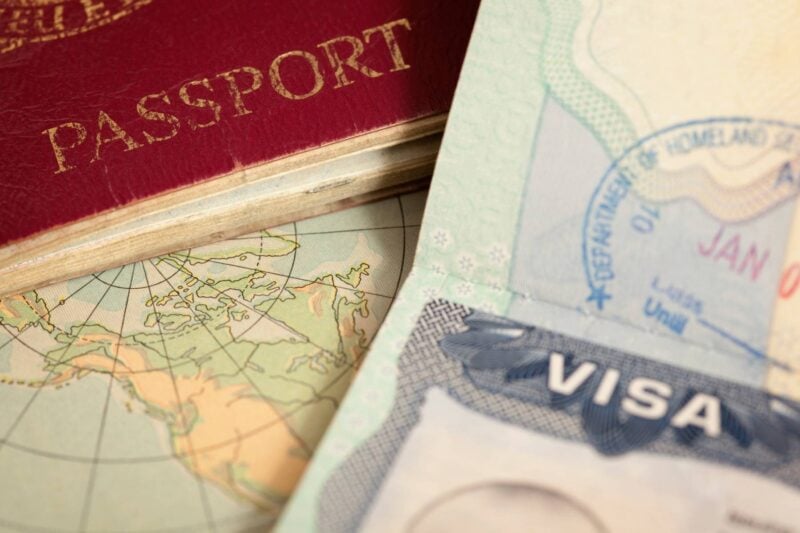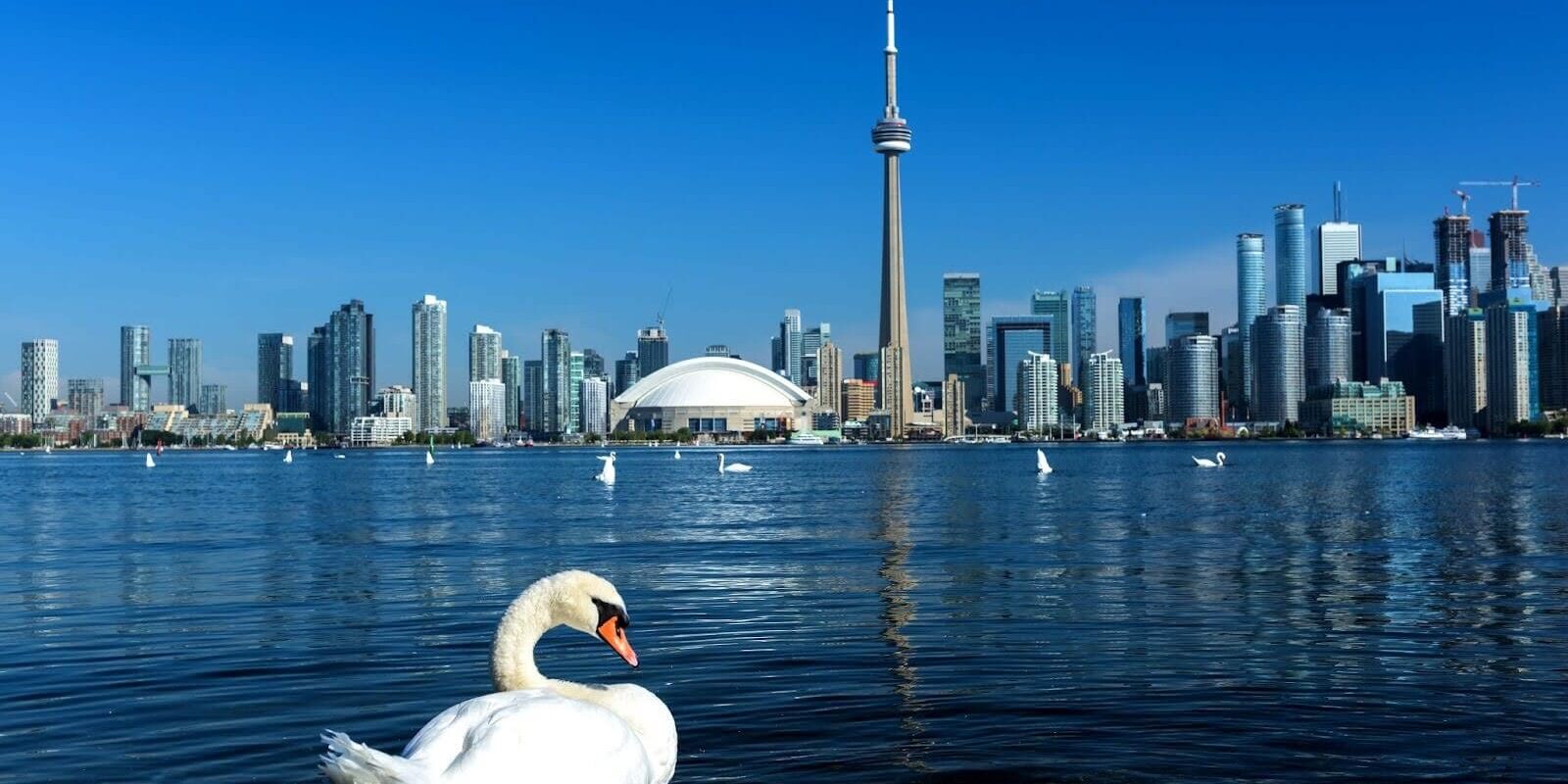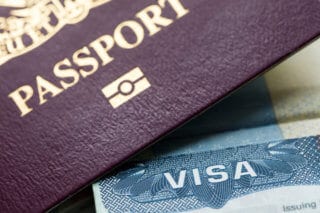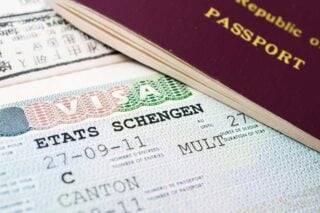
Getting the Right Visa for Your Overseas Adventure
 If you’re planning to live, work, study, travel, or retire in another country for more than three months, you will need to apply for a visa. However, visa requirements vary depending on your nationality and destination. While some countries have straightforward immigration processes, others have more complex regulations.
If you’re planning to live, work, study, travel, or retire in another country for more than three months, you will need to apply for a visa. However, visa requirements vary depending on your nationality and destination. While some countries have straightforward immigration processes, others have more complex regulations.
The type of visa you need may also differ depending on your purpose for moving abroad, whether for employment, education, leisure, or retirement. Therefore, it's important to secure the appropriate visa well in advance to ensure a smoother transition to your new adventure abroad. To help you navigate this process, this article outlines the various visa options available for popular expat destinations and the requirements for each country.
If you’re planning to live, work, study, travel, or retire in another country for more than three months, you will need to apply for a visa. However, visa requirements vary depending on your nationality and destination. While some countries have straightforward immigration processes, others have more complex regulations.
The type of visa you need may also differ depending on your purpose for moving abroad, whether for employment, education, leisure, or retirement. Therefore, it's important to secure the appropriate visa well in advance to ensure a smoother transition to your new adventure abroad. To help you navigate this process, this article outlines the various visa options available for popular expat destinations and the requirements for each country.
What is a Visa?
A visa is an official document that lets you enter, stay, or work in a foreign country. Think of it as permission from the country you’re visiting. Whether you’re going for a short vacation, to work, study, or retire, each visa has specific rules based on the length of your stay and purpose.
However, every country has its own set of rules and requirements for foreigners wanting to visit or relocate there. Your nationality and destination will also influence your visa needs. For instance, U.S. citizens can visit Canada, Mexico, France, and Italy without a visa for up to 90 days within 180 days for business or pleasure. However, they will need a visa to travel to Australia, Cuba, India, China, and other destinations worldwide.

Since visa laws and requirements can change, it's important to check reliable resources, such as official government websites, trusted visa application services, or a visa search tool, to determine if you’ll need a visa before your next trip.
It's also essential to check what documents you must gather well in advance. For instance, you might need health insurance, financial guarantees, or proof of accommodation. Even if you have visited a country before, always verify the current visa requirements, as they may have been updated.
Read More: Countries You Can Visit Without a Visa
What Is the Purpose of Your Stay?
Understanding the purpose of your visit is crucial in determining the type of visa you will need. Different countries have varying visa requirements for:
- Students planning to attend school
- Tourists visiting on vacation
- Expats looking to make a permanent move
- Skilled workers seeking employment who may face additional hurdles such as labor market tests
- Digital nomads planning to work remotely from abroad
For instance, while U.S. citizens can travel to France without a visa for tourism, they will need to apply for a long-stay visa if they plan to stay longer than 90 days or want to immigrate to France permanently. This process often requires proof of income, health insurance, and sometimes background checks, which can take time to complete.

Find the Best International Insurance
- Compare multiple quotes and coverage options
- Work with an insurance expert at no additional cost
- Find the best plan for your needs and budget
Similarly, U.S. citizens can vacation in New Zealand for up to 90 days without a visa, but they must obtain the appropriate visa if they plan to work or study there. You can read more about this in our article on immigrating to New Zealand.
Notably, if you're considering moving to another country for an extended period, some countries, such as Ireland and Italy, allow you to become a citizen through dual citizenship based on your ancestry. This will enable you to hold two passports, which provides greater flexibility while traveling. Read more about how to get Irish citizenship.
Read More: Student Visas for the United States
How Long Can You Stay On Your Visa?
Every visa has an expiration date, and you must leave the country once it expires. Some are valid for several days, while others allow you to stay for several months or years.
For example, U.S., Canadian, and most EU citizens can visit Costa Rica for up to 90 days without a visa. If you wish to stay longer, all you have to do is leave the country for one day, visit a neighboring country, and return to Costa Rica. As soon as you return, your 90-day allowance period starts again.

However, be aware that Costa Rican immigration authorities have become stricter, and the "border run" tactic may no longer be reliable. Travelers attempting to reset their stay could face re-entry denial or increased scrutiny, so staying informed about these evolving practices is essential.
If you're considering studying in Australia, a student visa will typically allow you to stay for up to five years as long as you are enrolled full-time. On the other hand, many Chinese tourist visas are valid for only 30 days, although some categories may permit longer stays. This contrast underscores the importance of understanding each country's visa requirements to avoid complications during your travels.
If you're planning a long-term stay abroad, it's also crucial to understand residency permits. For instance, in countries like Germany or Spain, you must apply for a residence permit upon arrival, even if you enter on a long-stay visa. This residence permit often requires additional documentation and must be renewed annually.
Visas Options for Popular Expat Destinations
Visa requirements vary widely depending on your nationality, the length of your stay, and the purpose of your visit. Below is an overview of visa options for some of the most popular destinations around the world:
Canada
Canada is known to be one of the safest places to live, but entry requirements are some of the strictest in the world. If you’re traveling to Canada by land, such as driving from the U.S., you may not need a visa – but that depends on your country of origin.
Many travelers from visa-exempt countries do not need a visa if they obtain an Electronic Travel Authorization (eTA) when traveling by air. However, some may be "inadmissible" due to criminal history or other factors, so it's important to check your eligibility.

Visa options for Canada include:
- Temporary Resident Visa
- Permanent Resident Visa
- Work Visa (e.g., Express Entry)
- Study Permit
- Super Visa (for parents and grandparents of Canadian citizens)
Skilled workers may qualify for the Express Entry system, a points-based immigration program. Additionally, those looking to retire in Canada can apply for the Super Visa, which allows eligible parents and grandparents of Canadian citizens to stay in the country for extended periods.
Read More: Canadian Work Visas
Dubai
Whether you’re visiting Dubai or another location in the UAE, you must secure the proper visa. Citizens from certain countries may obtain a visa upon arrival, which is typically valid for 30 days. If you plan to stay longer, you will need to contact the local immigration office for the appropriate visa.
Visa options for Dubai include:
- Remote Working Visa (for digital nomads)
- Employment Visa
- Investor Visa
- Retirement Visa (up to five years for eligible retirees)
The Remote Working Visa allows digital nomads to live in the UAE while working for foreign companies. Additionally, the Retirement Visa permits eligible retirees to reside in the UAE for up to five years, provided they meet specific financial criteria.
Read More: Work Visas in Dubai
France
Dreaming of the City of Light or the wine country of Bordeaux? U.S. and EU citizens do not need a visa for short stays of up to 90 days. However, if you plan to stay longer, you will typically need a long-stay visa, which is also required for those looking to retire in the country. U.S. citizens must also apply for a French residence permit upon arrival if they intend to live there long-term.
For non-EU nationals, the Schengen Visa allows short-term stays of up to 90 days within 180 days for tourism or business purposes across most countries in the Schengen Area. There are 27 Schengen Visa countries, and this visa allows you to travel freely between them within that time limit. However, to stay longer than 90 days, you must apply for a specific national visa or residence permit.
French visa options include:
- Schengen Visa (for short-term stays)
- Long-Stay Visa (for stays over 90 days)
- Residence Permit (required for long-term stays)
- Work Visa
- Student Visa
Read More: French Work Visas
Germany
Germany is a popular choice for expats due to its robust economy, high standard of living, and central location in Europe. As part of the Schengen Area, U.S. citizens and nationals of many other nations can visit the country for tourism or business purposes without a visa for up to 90 days within 180 days. However, if you plan to stay longer for work, study, or retirement, you’ll need the correct expat visa or residency permit.

Visa options for Germany include:
- Work Visa
- EU Blue Card (for skilled workers)
- Student Visa
- Freelancer or Self-Employment Visa
- Retirement Visa
You can read more about these on the German Federal Foreign Office website or your local German embassy or consulate.
Read More: Work Visas in Germany
Italy
Italy's rich history, stunning landscapes, and vibrant culture are highly appealing to foreigners. If you're a U.S. citizen or from a Schengen Area country, you can visit the country for up to 90 days within 180 days without needing a visa.
However, if you plan to stay longer, you must apply for the correct visa or residency permit. Notably, those looking to retire in Italy can apply for a Retirement Visa if they can prove a steady income.
Italian visa options include:
- Elective Residence Visa
- Work Visa
- Student Visa
- Investor Visa
- Retirement Visa
You can read more about these on the Italian Ministry of Foreign Affairs website or at your local Italian embassy or consulate.
Read More: Work Visas in Italy
Malaysia
Many foreigners choose to retire in Malaysia, and the Malaysia My Second Home (MM2H) visa program is partly responsible for that. This expat visa is valid for ten years and allows foreigners multiple entry into the country if they meet specific financial requirements. For those seeking a more relaxed lifestyle, the MM2H S-MM2H (Sarawak) offers a long-stay option tailored for retirees in the Sarawak region.
Visa options for Malaysia include:
- Employment Pass
- Student Pass
- Dependent Pass
- Long-Term Social Visit Visa
- Investor Visa
- Malaysia My Second Home (MM2H) visa program for retirees
The official Malaysian Government website has a complete list of all Malaysian visas and requirements.
Panama
Depending on your country of origin, you may or may not need a visa to enter Panama. Certain nationals might be exempt or qualify for a visa waiver, while others must obtain an authorized visa before traveling.
Foreigners looking to retire in Panama can apply for the popular Pensionado Visa, which allows retirees with a steady income to gain residency. This expat visa has many benefits, including discounts on services and healthcare.
Visa options for Panama include:
- Tourist Visa
- Retirement Visa
- Work Visa (e.g., Temporary Work Visa)
- Investor Visa
You can find specific visa requirements for Panama on the official Panamanian Government website.
Singapore
Like most countries, the visa requirements for entry into Singapore vary depending on your nationality, the length of your stay, and the purpose of your visit. While many nationalities don’t require a visa for short visits, some must secure one in advance.
Singapore offers the following visas:
- Employment Pass
- S Pass
- Tech.Pass (for digital nomads)
- Long-Term Visit Pass (for parents of citizens)
- Student Pass
The Employment Pass caters to skilled professionals, while digital nomads can apply for the Tech.Pass. The Long-Term Visit Pass allows parents of Singapore citizens or permanent residents to enjoy extended stays. For detailed information about all visa requirements, consult the Ministry of Foreign Affairs website.
Read More: The Easiest Countries to Get a Work Visa
Spain
Spain is a popular destination for expats due to its vibrant culture, beautiful landscapes, and high quality of life. As part of the Schengen Area agreement, U.S. citizens and citizens of EU/EEA countries can visit Spain for up to 90 days within 180 days without a visa.

However, for stays longer than 90 days or for specific purposes such as work, study, or retirement, it’s essential to apply for the correct visa in advance.
Spanish visa options include:
- Non-Lucrative Visa
- Work Visa
- Golden Visa
- Student Visa
- Residence Permit
For more detailed information about visa requirements, visit the Spanish Consulate website.
Read More: Spanish Work Visas
Thailand
If you’re considering a trip to Thailand, tourists can apply for a visa that permits stays of either 15 or 30 days, depending on their nationality.
Thailand offers various visa options, including:
- Tourist Visa
- Retirement Visa (extendable annually for those over 50)
- Work Visa
- Digital Nomad Visa
The retirement visa is particularly popular among eligible foreigners over 50, as it allows for annual extensions. The Thai government has also introduced digital nomad programs that enable remote workers to stay in the country for extended periods.
Our article on Thai visas for tourists and expats explains more, and the Thai Embassy website provides information on Thailand visas.
Read More: Top 15 Countries With Digital Nomad Visas
United Kingdom
If you’re planning to visit, work, or live in the U.K., visa requirements will depend on your nationality and the purpose of your stay. Citizens of many countries, including the U.S. and E.U. nations, can visit the U.K. for tourism or business for up to six months without needing a visa. However, for stays longer than six months or for those intending to work or study, you must apply for the relevant expat visa.
The U.K. provides several visa categories tailored to specific needs, including:
- Tier 2 (General) Work Visa
- Student Visa
- Ancestry Visa (for individuals with British ancestry wishing to retire in the U.K.)
- Skilled Worker Visa
Visit the U.K. Government Visas and Immigration website for more information about visa types, requirements, and application processes.
Read More: U.K. Work Visas
United States
Before traveling to the United States, it’s essential to check the latest information regarding U.S. visa policies and requirements, as these can change frequently.
Under the Visa Waiver Program (VWP), citizens of many countries, including the U.K. and EU nations, can visit the U.S. for tourism or business for up to 90 days without needing a visa. However, travelers must have an approved Electronic System for Travel Authorization (ESTA) before departure.
Visa options for the United States include:
- B-1 Business Visa
- B-2 Tourist Visa
- H-1B Work Visa
- F-1 Student Visa
- K-1 Fiancé(e) Visa
- L-1 Visa
- O-1 Visa
- Retirement Visa
- Green Card (Permanent Residency)
For detailed guidance, consult the U.S. Citizenship and Immigration Services (USCIS) website or visit the U.S. Department of State’s visa information page.
Read More: U.S. Work Visas
Don't Forget, Preparation Is Key!
Where are you coming from? Where are you headed? What is the purpose of your visit or stay? As discussed, these questions are crucial in determining whether you need a visa for your next trip.
Before booking your plane ticket or packing your bags, thoroughly research the visa requirements for your destination.
Check if you need health insurance or proof of financial stability as part of the application process. By preparing ahead of time and gathering all necessary documents, you can confidently secure the visa you need to travel almost anywhere in the world.
Useful Resources
- Schengen Visa Information: The website explains visa requirements and procedures for short-term travel to countries within the Schengen Area, including application steps and required documents.
- VFS Global: Provides visa application services for numerous countries, helping people submit their applications and schedule appointments.
- TLScontact: This company processes visa applications for several countries, including the U.K., France, and China, helping applicants manage and submit their applications.
- VisaHQ: Offers visa processing services and information for a wide range of countries, assisting travelers with the entire application process for tourist and business visas.
- IATA Travel Centre: Provides an online tool to check visa requirements and travel document guidelines based on nationality and destination.




